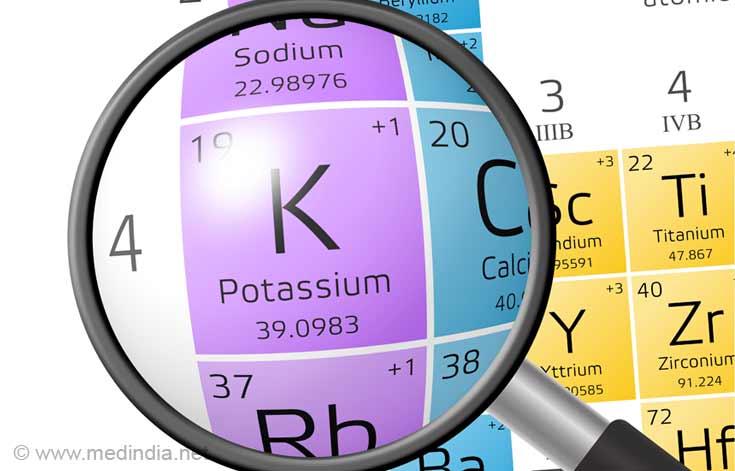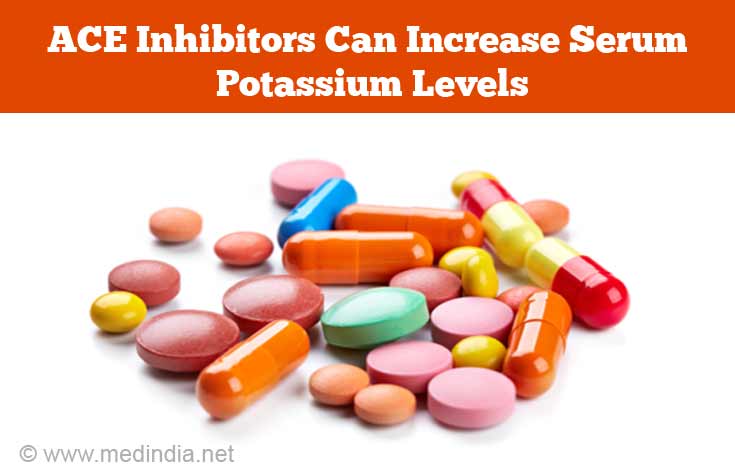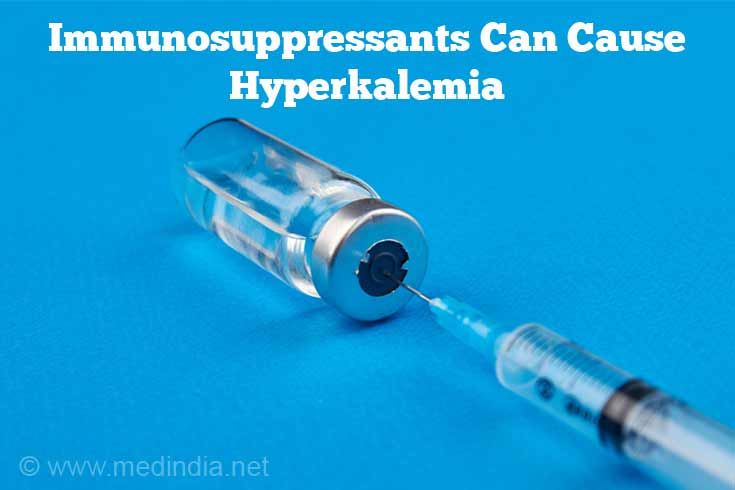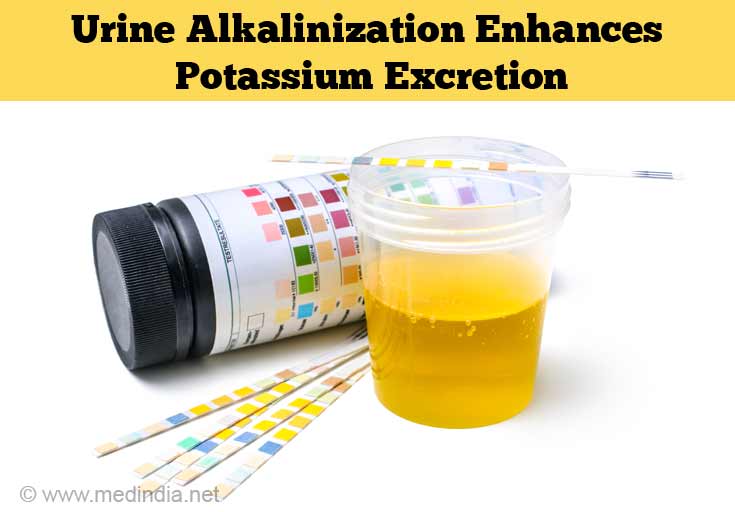- Hyperkalemia Revisited - (http://www.ncbi.nlm.nih.gov/pmc/articles/PMC1413606/)
- High potassium (hyperkalemia) - (http://www.mayoclinic.org/symptoms/hyperkalemia/basics/when-to-see-doctor/sym-20050776)
- Management of severe hyperkalemia - (http://emcrit.org/wp-content/uploads/Management_of_severe_hyperkalemia.18.pdf)
- Hyperkalemia - (https://en.wikipedia.org/wiki/Hyperkalemia)
What is Potassium?
The body requires several essential minerals for performing various physiological functions. Potassium derived from Latin word Kallium is an electrolyte required by the body. It helps to maintain the intracellular osmotic pressure and plays a major role in transmission of nerve impulses. It is important for the proper biosynthesis of protein.
Potassium that is present outside the cells influences the activity of the heart. Meat, milk, sweet potato, nuts, beans, salmon and fruits like banana are rich sources of potassium. The Normal Plasma Potassium level is 3.5 -5.5 meq/L (milliequivalent per liter).

What is Hyperkalemia?
Hyperkalemia is a condition characterized by high levels of potassium in the blood (> 5.5 meq/L). The kidneys regulate the total potassium level in the body and excrete excess amounts in the urine. High potassium levels in the blood occur due to the decreased flow of the blood to the kidneys or due to kidney problem. In addition, several drugs can also cause high serum potassium levels. This is especially true in patients with kidney failure; when the kidneys cannot adjust the potassium levels.
What are the Drugs that Increase Serum Potassium Level?
Drugs that can induce hyperkalemia are mainly those which interfere with its urine excretion. Some of the common drugs that cause hyperkalemia are as follows:
- Angiotensin-converting enzyme inhibitors (ACE inhibitors) - ramipril, enalapril, lisinopril
- Angiotensin receptor blockers - losartan, irbesartan telmisartan, candesartan, olmesartan
- Potassium-sparing diuretics - spironolactone
- Antibiotics like - Trimethoprim
- Immunosuppressants (calcineurin inhibitors) – Cyclosporine, tacrolimus
- Non-Steroidal Anti-inflammatory Drugs (NSAIDs) – ibuprofen, naproxen, celecoxib
Angiotensin Converting Enzyme Inhibitors (ACE inhibitors)
ACE inhibitors are commonly used in the treatment of hypertension, heart failure, heart attack and diabetic nephropathy (kidney disease due to diabetes). Drugs like captopril, enalapril, lisinopril, perindopril, fosinopril, trandolapril, ramipril, imidapril and benazepril are ACE inhibitors. They prevent the conversion of the hormone angiotensin I to angiotensin II in the body. This results in decreased levels of another hormone aldosterone which is responsible for the proper excretion of potassium, thus resulting in hyperkalemia.

Angiotensin Receptor Blockers /Angiotensin Receptor Antagonist
Angiotensin receptor blockers are similar to ACE inhibitors and are also associated with hyperkalemia. They block the effect of angiotensin II on its receptors. Commonly used angiotensin receptor antagonists include losartan, candesartan, irbesartan, valsartan and telmisartan. They are also used in the treatment of high blood pressure, cardiovascular and kidney diseases.
Potassium-Sparing Diuretics
Diuretics are drugs that bring about excess excretion of water and electrolytes through the urine. Several diuretics cause loss of potassium. To prevent this, potassium-sparing diuretics are sometimes used. Common potassium-sparing diuretics include amiloride, spironolactone and triamterene. However, under certain conditions like kidney disease, these drugs can cause excess retention of potassium, resulting in hyperkalemia. Spironolactone acts as an aldosterone antagonist. It is useful in the treatment of cirrhotic and nephrotic edema (accumulation of excess fluid due to liver or kidney disease), heart failure and high blood pressure.
Antibiotics
- Antibiotics are usually drugs produced from microorganisms which are commonly used in the treatment of bacterial infections. Cotrimoxazole a fixed dose combination of trimethoprim and sulphamethoxazole is a widely used antibiotic for urinary and respiratory tract infections, in the treatment of bacterial diarrhea and dysentery. Trimethoprim can cause hyperkalemia as an adverse effect by retaining potassium in the kidneys in a manner similar to that of some potassium-sparing diuretics. The increased risk of hyperkalemia after the intake of trimethoprim is mainly due to an overdose of the drug, kidney failure or due to decreased secretion of aldosterone in the body.
Immunosuppressants
Drugs that inhibit an immune response are known as immunosuppressants. Drugs like Cyclosporine and Tacrolimus mainly act by inhibiting a specific protein called Calcineurin and hence known as Calcineurin inhibitors. These drugs act by inhibiting the proliferation of specific T cells in the immune system. Their major use is in the treatment of autoimmune diseases like rheumatoid arthritis, asthma, dermatomyositis (inflammation of the skin and underlying muscle) and in organ transplantation. Some drugs like cyclosporine cause damage to the kidney. Cyclosporine when given to patients who take potassium supplements and potassium-sparing diuretics can cause hyperkalemia.

Non-Steroidal Anti-inflammatory Drugs (NSAIDS)
NSAIDs are painkillers which reduce fever and inflammation Aspirin, paracetamol, ibuprofen, naproxen, diclofenac, celecoxib are some of the commonly used NSAIDs. Selective Cyclo oxygenase (COX 2) inhibitors like celecoxib, etoricoxib, parecoxib mainly act by inhibiting the cyclo oxygenase enzyme and possess a high risk of increased serum potassium levels when compared to other non selective NSAIDs. These drugs can cause hyperkalemia and should be used with caution in individuals prone to high potassium levels.
Other drugs like pentamidine, digoxin, heparin and derivatives may also lead to hyperkalemia.
What are the Symptoms of Hyperkalemia?
Symptoms of hyperkalemia are as follows:
- Palpitations
- Nausea
- Paralysis
- Weakness and
- Abnormal heart rhythms resulting in deadly arrhythmias.
- Muscle fatigue

What is the Treatment and Preventive Measures for Hyperkalemia?
Hyperkalemia is a life-threatening condition that can lead to disturbances in cardiac rhythms which can be fatal, therefore treatment should be initiated as soon as possible. Treatment for hyperkalemia mainly involves:
Antagonizing the Effect of Potassium on Cell Membrane
10 ml of calcium chloride or calcium gluconate for injection is given intravenously for 10 minutes to antagonize or oppose the effects of potassium on the heart. The electrocardiogram (ECG) is carefully monitored and the onset of action was found to be less than three minutes.
Redistributing the Extracellular Potassium into the Cells
Insulin 10 units IV with dextrose 25-40g is helpful moving excess blood potassium into muscle cells, thereby reducing its level in the blood.
Rarely, drugs like terbutaline are also used along with insulin in the nebulized form or by intravenous infusion due to its additive effect.
Enhancing the Elimination of Potassium from the Body
Loop diuretics with high efficacy like furosemide (40-80 mg IV) and bumetanide (2-4 mg IV) are given to increase potassium elimination.
Hemodialysis is consistently helpful in removing the excess potassium in patients with renal failure.
Alkalinization of urine by administering sodium bicarbonate infusion 150mmol/L every 4-6 hours enhances potassium excretion.

Preventive Measures
Hyperkalemia due to medications can be prevented by monitoring the serum potassium level in susceptible patients from time to time by:
- Selecting proper dose of the drug
- Replenishing the body with isotonic fluids
- Discontinuing or stop using the drug if blood potassium levels increase
- Avoiding use of more than one drugs that increase serum potassium levels
- Avoiding use of potassium retaining drugs in patients with kidney problems
 MEDINDIA
MEDINDIA
 Email
Email




